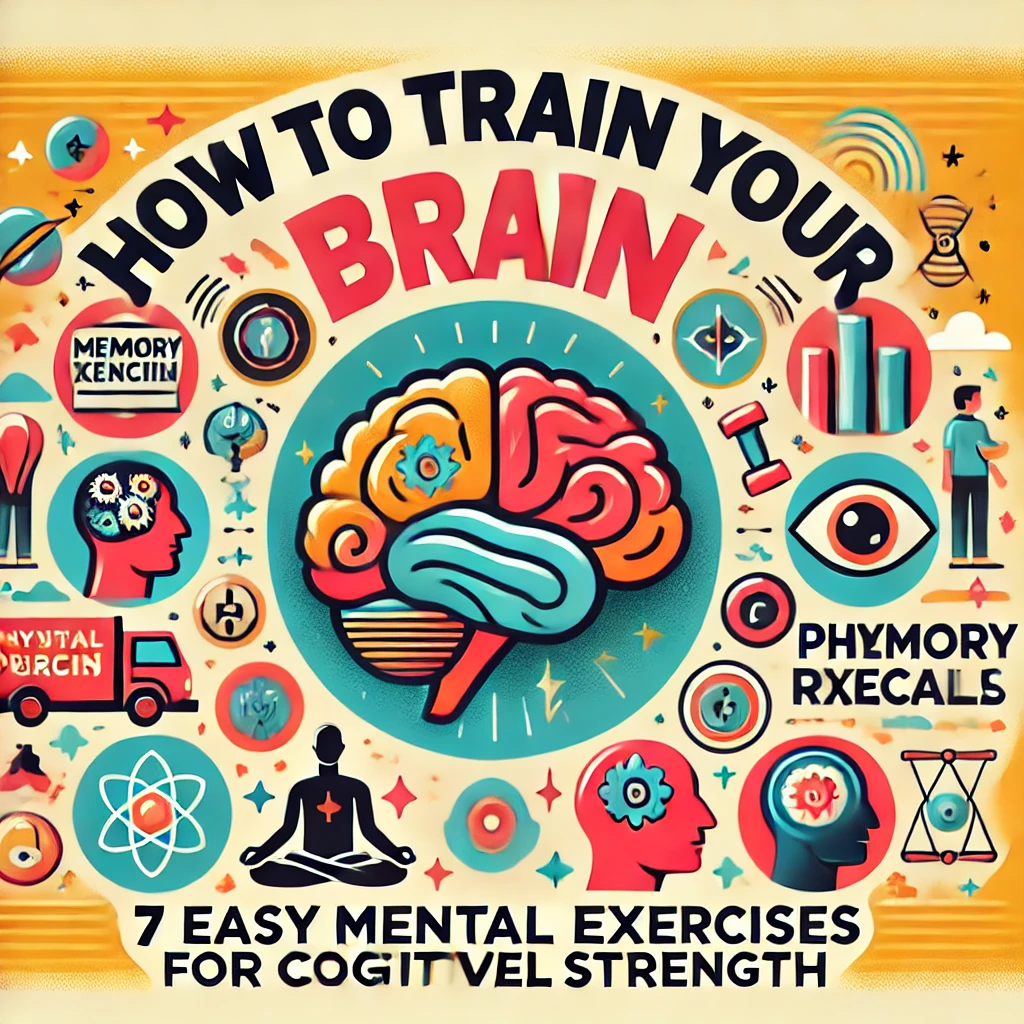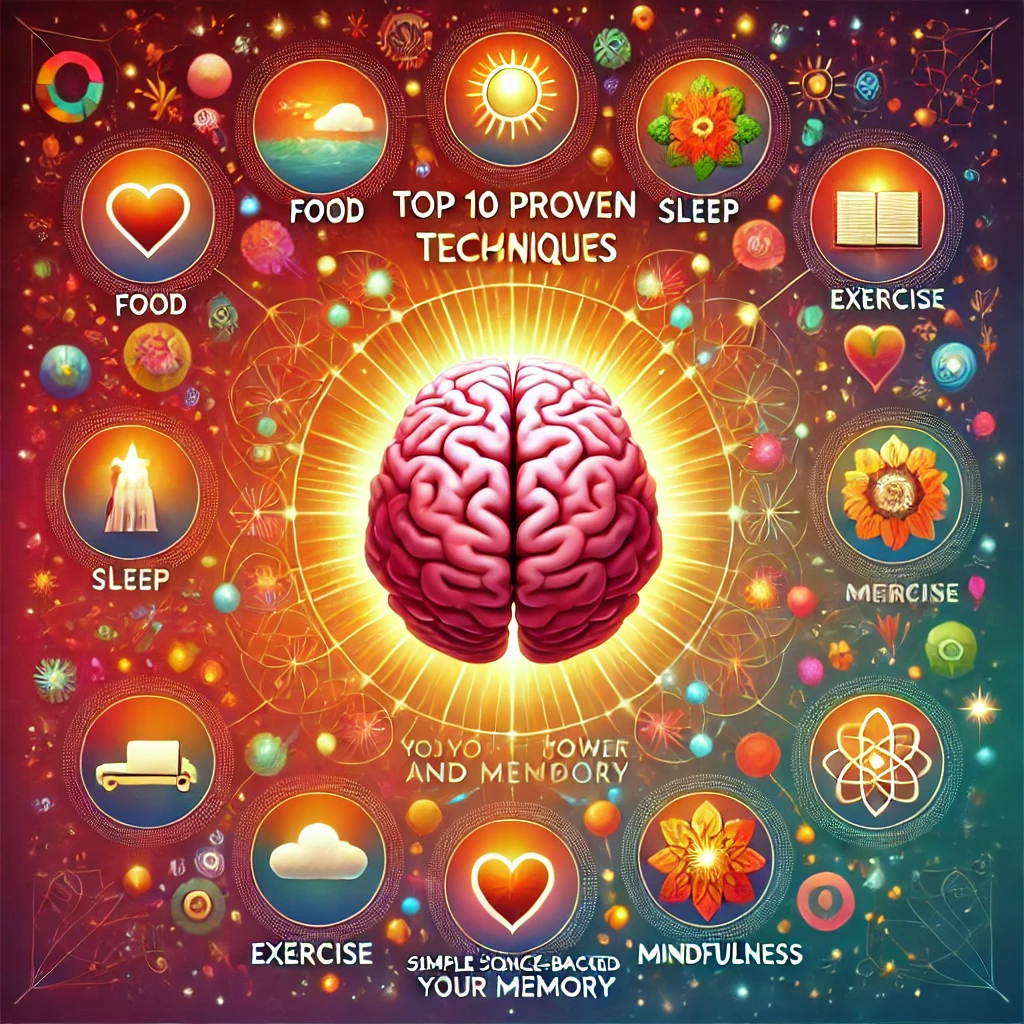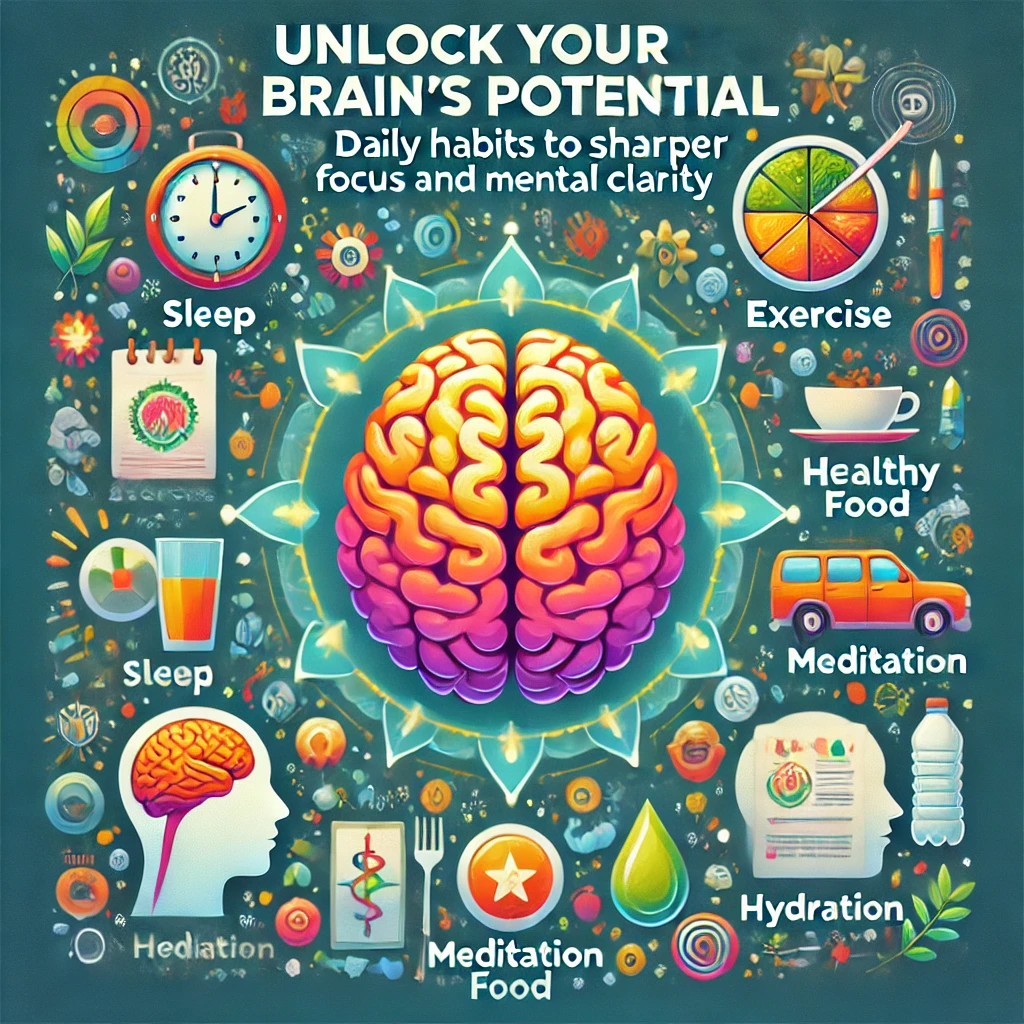Introduction
Have you ever wished you could think faster, remember details more easily, or stay focused even in a sea of distractions? You’re not alone. In our fast-paced world, mental clarity and cognitive strength are more valuable than ever. The good news is that, just like any other muscle, you can train your brain to be stronger and more resilient.
In this guide, we’ll dive into some easy, enjoyable mental exercises for brain power that will help you strengthen cognitive abilities, improve focus, and enhance memory. Whether you’re looking for brain training techniques or simple cognitive strength exercises to add to your daily routine, these tips will help you unlock your brain’s full potential.
1. Mind Mapping: Organize and Enhance Your Thinking
Mind mapping is a brain training technique that involves creating a visual representation of ideas and their connections. This exercise not only helps you organize your thoughts but also improves your ability to think creatively and see the bigger picture.
Relatable anecdote:
I used to struggle with organizing my ideas for work projects, often feeling overwhelmed by all the details. But when I started mind mapping, I found it much easier to see connections and arrange information logically. Now, it’s my go-to method whenever I have a complex task.
How to practice mind mapping:
- Start with a central idea or topic in the middle of a blank page.
- Draw branches for each related concept, adding sub-branches for supporting ideas.
- Use colors, images, and symbols to make connections clearer and more memorable.
2. Memory Recall: Strengthen Your Memory Muscles
Memory recall is a simple yet effective mental exercise for brain power. Practicing memory recall strengthens neural connections and makes it easier to retrieve information when you need it.
Example:
Think of memory recall as exercising a muscle. The more you practice retrieving information, the stronger and faster your memory becomes. I started doing this with my grocery list, challenging myself to remember each item without looking. Over time, I noticed my memory improving in other areas too.
How to practice memory recall:
- Before going to bed, try to recall three things you did that day in as much detail as possible.
- Test yourself on things like grocery lists, to-do lists, or important dates.
- Try to remember conversations or key points from meetings without checking your notes.
3. Puzzles and Games: Train Your Brain with Fun Challenges
Puzzles and brain games are some of the most enjoyable ways to train your brain. They require problem-solving, pattern recognition, and critical thinking—all of which help boost cognitive skills naturally and improve cognitive function over time.
Relatable anecdote:
A friend introduced me to Sudoku a few years ago, and I quickly became hooked. Not only did I find it relaxing, but I also noticed it made my mind sharper and helped me think more logically. Now, I use puzzle games as a way to unwind and strengthen my cognitive abilities.
Popular puzzles and games for cognitive strength:
- Sudoku, crosswords, or logic puzzles
- Chess and other strategy games
- Brain-training apps like Lumosity or Peak
4. Visualization Exercises: Boost Memory and Creativity
Visualization exercises involve creating vivid mental images to help remember information or think creatively. Visualization is one of the most powerful brain training techniques, as it engages multiple senses and strengthens the brain’s ability to store and recall information.
Example:
When I started using visualization for remembering names, it became much easier to recall them later. If I met someone named “Rose,” I’d picture a bright red rose next to them in my mind. It’s a small trick that makes a big difference in my memory skills.
How to practice visualization:
- Try to imagine things you want to remember in as much sensory detail as possible.
- If you’re trying to memorize a list, picture each item in a specific location or scene.
- Use visualization to help with goal setting by imagining the steps and outcome vividly.
5. Learning Something New: Keep Your Brain Flexible
One of the best cognitive strength exercises is to learn something new. When you take on a new skill, like learning a language or musical instrument, your brain adapts and grows new connections, which enhances memory and cognition.
Relatable anecdote:
I recently started learning Spanish, and while it was challenging at first, I could feel my brain working in ways it hadn’t before. Not only did it improve my memory, but I noticed I was more focused and detail-oriented in other areas of my life.
Ideas for learning new skills:
- Take up a new language with an app like Duolingo.
- Learn to play an instrument, such as the guitar or piano.
- Try a new hobby, like painting, knitting, or cooking a new cuisine.
6. Meditation and Mindfulness: Train Your Brain to Focus
Meditation is one of the most effective ways to improve cognitive function and mental clarity. Practicing mindfulness helps you stay present, reduces stress, and trains your brain to focus better. Even just a few minutes of meditation each day can make a noticeable difference.
Example:
I started meditating for just five minutes a day, and it’s been life-changing. I feel more focused and can think more clearly, even during stressful days. Meditation is like a “reset” button for my mind, helping me stay centered and mentally sharp.
How to start meditating:
- Set aside 5-10 minutes each day to sit quietly and focus on your breath.
- Use a meditation app if you need guidance (e.g., Headspace or Calm).
- Practice mindfulness throughout the day by bringing attention to whatever you’re doing, whether it’s eating, walking, or listening to someone.
7. Physical Exercise: Boost Brain Function with Movement
Physical exercise is not only good for your body; it’s also essential for cognitive health. Exercise increases blood flow to the brain, supports the growth of new neurons, and enhances focus, memory, and cognitive function. Studies have shown that regular physical activity can improve brain power and help delay cognitive decline.
Relatable anecdote:
I used to struggle with staying focused in the afternoons. But once I started taking a short walk during lunch, I noticed a huge improvement in my energy and focus. Exercise has become an essential part of my brain workout for focus and overall mental clarity.
How to incorporate exercise for cognitive benefits:
- Aim for at least 30 minutes of moderate exercise most days of the week.
- Try incorporating activities you enjoy, like cycling, dancing, or swimming.
- Don’t have time for a full workout? Even a 10-minute walk can help boost mental clarity.
Practical Tips for Incorporating Brain Training Exercises Daily
Adding these mental exercises for brain power into your routine doesn’t have to be difficult. Here are a few practical tips to help you make brain training a part of your daily life:
- Start small: Try incorporating one or two exercises at a time, rather than trying to do everything at once.
- Be consistent: Like physical exercise, cognitive training is most effective when done regularly. Aim for a few minutes each day.
- Make it enjoyable: Choose exercises that you enjoy. If you like puzzles, make it a part of your morning routine. If you enjoy meditation, add it to your wind-down routine at night.
Conclusion
Training your brain isn’t about making drastic changes or adopting complicated techniques. It’s about simple, consistent practices that keep your mind sharp and resilient over time. By incorporating these cognitive strength exercises into your routine, you’ll be well on your way to boosting your mental agility, enhancing memory, and strengthening cognitive abilities.
Remember, the key is to be patient and persistent. With time, you’ll notice improvements in your focus, memory, and ability to think creatively. So go ahead, try out these brain workout ideas, and start building a stronger, sharper mind today.
FAQ Section
1. What is the best exercise to improve cognitive function?
Meditation, puzzles, memory recall, and physical exercise are all effective for improving cognitive function. Regular practice of any of these exercises can yield positive results.
2. How often should I do brain exercises?
Consistency is more important than intensity. Try to practice brain exercises daily, even if just for a few minutes.
3. Can learning a new skill improve memory?
Yes, learning something new forces your brain to form new neural connections, which strengthens memory and enhances cognitive flexibility.
4. How does meditation benefit cognitive health?
Meditation reduces stress, improves focus, and strengthens your brain’s ability to retain information by promoting a calm and centered mind.
5. Are brain games like Sudoku effective for mental strength?
Yes, brain games like Sudoku and crosswords challenge your mind, improve problem-solving skills, and enhance memory over time.
6. How does physical exercise impact brain health?
Physical exercise increases blood flow to the brain, supports neuron growth, and has been linked to improved memory and delayed cognitive decline.
7. What is a quick mental exercise for improving memory?
Memory recall is an easy yet powerful exercise. Try recalling your day’s events or testing yourself on short lists to improve memory naturally.
8. How can visualization help with memory?
Visualization creates vivid mental images, making it easier to remember details by engaging multiple senses.
9. Can I improve cognitive skills naturally without supplements?
Absolutely! Cognitive skills can be enhanced with natural practices like regular exercise, meditation, learning new skills, and mental exercises.



